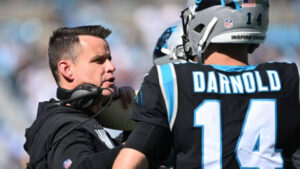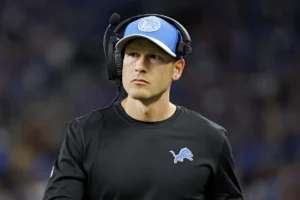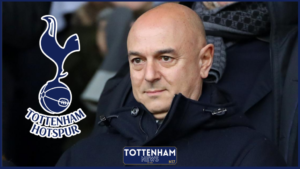Carolina’s front office made the strategically correct call to trade up and select their franchise quarterback in the 2023 draft.
(Note: This is Part I of a two-part series behind the Panthers decision to trade up and select Bryce Young No. 1 overall in the 2023 draft.)
Before the 2023 NFL draft the Carolina Panthers front office had a monumental decision to make:
Continue on the hamster wheel of mediocrity, or trade up from No. 9 to No. 1 and draft a franchise quarterback.
Owner David Tepper and GM Scott Fitterer chose the latter.
From a strategic standpoint, it was absolutely the right move.
Carolina’s front office traded up for the No. 1 overall pick in this year’s draft and selected Alabama’s Heisman Trophy winning quarterback Bryce Young. In the process Carolina parted with the No. 9 and No. 61 picks in the 2023 draft, their 2024 first round pick, a 2025 second rounder, and star wide receiver DJ Moore. The strategic thinking was sound. Sustained NFL success requires having a Pro Bowl caliber quarterback. Until Carolina found their franchise quarterback they would continue treading water, consigned to the lower rungs of football irrelevancy.
The Panthers front office viewed Young as the player who could turn Carolina into a long-term contender so they gave up the required assets to take him first overall.
While only time will tell if they made the right pick in Young over C.J. Stroud (the No. 2 overall pick) and Anthony Richardson (No. 4 overall), the decision to trade up and go all-in on a quarterback in 2023 was the right call for the front office to make.
The most likely path to sustained NFL success is drafting and developing a Pro Bowl caliber quarterback.
That’s exactly what the Panthers attempted to do by trading up to select Bryce Young.
The hamster wheel of mediocrity
If any fan base understands the strategic imperative of drafting and developing a franchise quarterback, it’s Panthers fans.
Lawrence (Jacksonville), Justin Herbert (Los Angeles), Lamar Jackson (Baltimore), and Tua Tagovailoa (Miami) were all drafted by the teams they led to the postseason last year.
In 2022 four of the seven NFC playoff participants drafted and developed their quarterbacks in Jalen Hurts (Philadelphia), Dak Prescott (Dallas), Brock Purdy (San Francisco, partial-year starter), and Daniel Jones (New York). The exceptions were Kirk Cousins in Minnesota but the four-time Pro Bowler has led the Vikings offense since 2018, Tom Brady in Tampa Bay after his 20-year run in New England (where he was drafted and developed), and Geno Smith’s shocking career resurrection in Seattle.
In summary, 11 of the 14 playoff teams last year drafted and developed their quarterbacks.
Fast forward to this season and the 11 teams that made the playoffs last year behind quarterbacks they drafted and developed are a combined 43-23 (.652) this season. The majority of them should be back in the playoffs this year.
From a roster construction standpoint, nothing is more important than drafting and developing a Pro Bowl caliber quarterback.
What the Panthers traded away
With the Panthers sitting on an 0-6 record, a host of Carolina fans are lamenting the assets the team parted with to move up from No. 9 to No. 1, especially giving up next year’s first round pick. If the season ended today the 2024 first round pick the Panthers traded to the Bears would be the No. 1 overall selection in the draft.
But it’s flawed logic to think the Panthers potentially traded away next year’s No. 1 overall pick.
The reality is if Carolina had not traded up in the 2023 draft and just kept the No. 9 pick, No. 61, and DJ Moore they likely wouldn’t be 0-6 right now. Let’s just assume they went with Andy Dalton or a similar bottom-tier free agent as their starting quarterback this season, added some depth with the No. 9 and No. 61 picks, and retained DJ Moore who put up another 1,000-plus yard season. In that scenario the 2023 Panthers would probably mimic what the team has done over the last five years and gone something like 6-11 this year.
If the Panthers went 6-11 (or thereabouts) in 2023 they would draft somewhere around No. 8 in 2024, which once again would likely prevent them from drafting a franchise quarterback. In this alternate reality Carolina’s 2023 season would be another spin on the hamster wheel of mediocrity while ending the season just as they began it – lacking a franchise quarterback and lacking a viable path to obtaining one.
Yes, it can be frustrating that the Panthers gave up so many assets to draft Bryce Young.
But it would have been even more frustrating if the Panthers hadn’t traded up in the 2023 draft, finished this season with yet another pointless 6-11 record, then went into 2024 without a franchise quarterback.
The most realistic way to acquire a franchise quarterback is to draft him and develop him. In today’s NFL it’s the single most strategic imperative in building a long-term competitive roster.
That’s precisely what Carolina attempted to do by trading up for Bryce Young.
From a strategic standpoint, it was absolutely the right move to make.
(Part II in this series exploring if Bryce Young is “The Guy” will be posted next week.)








